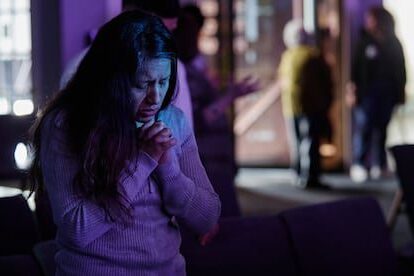BTN News: The scene is electric at New Life Church in Chicago. Between the pulsating rhythm of live gospel music and the impassioned speeches from Pastor Jaro Medina, this Sunday service feels more like a celebration than a solemn ritual. The atmosphere is filled with a blend of modern, pop-Latin gospel that has the congregation dancing and singing along, hands raised in joyous ecstasy. The message of Jesus is omnipresent, but the delivery is refreshingly colloquial and familiar, a stark contrast to more traditional religious services.
This dynamic approach is not only effective but essential to the church’s mission of increasing its followers. While other religious denominations in the United States face a decline in membership, Latino evangelical churches are experiencing remarkable growth. This trend, although somewhat under the radar, is reshaping the religious landscape and, by extension, the political balance in the country. Historically aligned with the Democratic Party, the growing evangelical influence is nudging Latino voters towards more conservative stances.
At New Life Church, sermons are delivered in Spanish, emphasizing the importance of making newcomers feel at home. Pastor Jaro Medina, a 40-year-old Puerto Rican, underscores that the first five minutes are crucial in determining whether a visitor will return. Greeters welcome everyone with warm smiles and blessings, offering coffee and engaging in heartfelt conversations about personal hardships. The goal is clear: create a sense of family and belonging from the very first interaction.
Pastor Jaro has been instrumental in the church’s growth over the past decade. From opening multiple Sunday services to adapting during the pandemic, his leadership has seen the congregation swell to around 500 members. His experience mirrors broader trends within the Latino evangelical community. While the percentage of Latinos identifying as evangelical has remained stable at around 25%, the actual number of followers has grown due to the increasing Latino population in the United States, now estimated at around 65 million.
The growth is particularly noticeable among immigrants and second and third-generation Latinos. In 2008, 22% of Latino immigrants identified as evangelical, a figure that rose to 32% by 2022. Among second-generation Latinos, the percentage increased from 23% to 29%, and from 27% to 31% for third-generation Latinos. This steady rise is bolstered by higher birth rates among evangelicals compared to the national average, suggesting that the influence of Latino evangelicals will continue to expand.
For many migrants, the church provides a vital support system in their new country. The community-oriented approach offers a sense of family and familiarity, which is especially comforting for those struggling with language barriers and the challenges of adapting to a new life. The welcoming environment, combined with the familiar accents, food, and affectionate interactions, makes the church a sanctuary for many.
Lizbeth Rodríguez, a church member, captures this sentiment perfectly: “For me, the church gives me family, it gives me this companionship… Although we are going through things, for example, my husband passed away, here I have a sister or a brother who helps me in this journey and encourages me, gives me encouragement, visits me. They are family in this world.”
The church’s appeal extends beyond emotional support. It also resonates with the idea of personal progress and economic prosperity, concepts deeply embedded in the American Dream. In these churches, poverty is not seen as a virtue. For individuals who have experienced poverty and are striving for a better life, the message of personal advancement and the rejection of vices is particularly appealing. This narrative positions Jesus not only as a spiritual savior but also as a champion of personal and economic growth.
This blend of spiritual and practical support has significant political implications. The Latino evangelical community, though not overtly political in their sermons, implicitly supports a conservative agenda through their teachings and values. This community is becoming a formidable political force, as evidenced by the activities of the National Hispanic Christian Leadership Conference (NHCLC). The NHCLC, led by figures like Samuel Rodríguez, plays a crucial role in shaping the political and social agenda of Latino evangelicals.
The NHCLC’s mission includes influencing culture, creating multiethnic communities, and fighting against moral relativism and cultural decadence. Their vision is to reform society by promoting biblical marriage, championing life, and protecting religious liberty. This ultra-conservative agenda is gaining traction, particularly as it aligns with broader evangelical goals.
As Latino evangelicals continue to grow in number and influence, their political power becomes increasingly significant. Their support was pivotal in the election of Donald Trump, who rewarded the evangelical community by appointing conservative justices to the Supreme Court, leading to the overturning of the federal right to abortion in 2022. Future elections will likely see the Latino evangelical lobby pushing for more conservative policies, particularly around abortion and family values.
In states like Florida, where Latino evangelicals have a strong presence, their influence is already evident in the passage of restrictive laws on abortion and LGBTQ+ content in schools. The question remains how this community will navigate the complex issue of immigration, given their support for legal immigration but acceptance of undocumented migrants within their congregations.
Despite the political undercurrents, the primary focus of Latino evangelical churches remains on community and faith. The average congregant is more concerned with the personal benefits of church membership, such as saving marriages and overcoming personal struggles, rather than broader political issues. However, their trust in pastoral guidance translates into significant voting power, and the plan to grow their numbers is in full swing.
The rise of Latino evangelicalism in the United States is a multifaceted phenomenon. It offers emotional and practical support to its followers, reshapes the religious landscape, and exerts considerable political influence. As this community continues to expand, its impact on American society and politics will undoubtedly become more pronounced.


